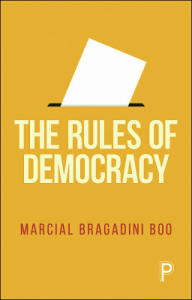Bristol University Press will be hosting ‘The Future of Democracy’ webinar on Thursday 29 September, 1pm-2pm BST with Marcial Bragadini Boo, author of The Rules of Democracy (Bristol University Press) and Geoff Mulgan, author of Another World is Possible (Hurst, 2022). Find out more and register here. A discount on both books will be available at the event.
How realistic is it for us to imagine a different world? And do we think that democracy needs to be and can be improved? We need to tap into our collectively limitless imagination to picture a better future and make it real.
To those working in UK public policy over the last two decades, Sir Geoff Mulgan is something of a guru. A former head of Prime Minister Tony Blair’s strategy unit, and Chief Executive of both the Young Foundation think tank and the innovation charity Nesta, Mulgan has written extensively on communication, power, strategy and social innovation. He is currently professor of collective intelligence, public policy and social innovation at University College London. His latest book, Another World is Possible, implores readers to use their creative imagination to achieve a better future.
He fears that the world is suffering from an ‘imaginary crisis’, in the sense that we are collectively failing to come up with new ways of thinking about our social and political realities and improving them. Academics, think tankers and politicians write far more often about why progress is difficult or why decline is likely, rather than suggest creative ideas for a better world. Mulgan wants this to change and quickly so that we can find answers to today’s challenge environmental, social and economic challenges. His book explains how imagination works, where ideas come from and how imagination can be harnessed to create a wiser society. And he suggests that, by opening up to new ideas from feedback and data, government can be better too.
Marcial Bragadini Boo, in his latest book, The Rules of Democracy, picks up Mulgan’s gauntlet. As a practitioner, he has laboured at the public sector coalface, most recently as chief executive for six years of the MPs’ spending watchdog, IPSA, and now as chair of the UK’s Institute of Regulation. He brings experience from both to suggest in his new book some radical innovations to the way we govern ourselves and run our democracy. He accepts that some of his innovations may sound preposterous now: a global parliament where accountable politicians make decisions about international issues; transparent taxation so we can all find out where our own taxes are spent; compulsory voting to increase fairness; and tighter rules on politicians to stop them telling lies and making unmeetable promises.
But, like Mulgan, Bragadini Boo recognises that social change starts with putting forward ideas for others to develop until consensus emerges that change is both necessary and possible. He reminds readers, as Mulgan does, that ideas once thought unachievable, whether legal same-sex marriage or compulsory seatbelts in cars, have been put into place and are now thought commonplace.
On 29 September, at our online event on the ‘The Future of Democracy’, Geoff Mulgan and Marcial Bragadini Boo will speak together to explain their thinking, find common ground and to challenge and be challenged about their own ideas about our democratic future, inviting the audience to share their own ideas and innovations.
Kathryn King is Marketing Manager at Bristol University Press and Policy Press.
 The Rules of Democracy by Marcial Bragadini Boo is available on the Policy Press website. Order here for £12.99.
The Rules of Democracy by Marcial Bragadini Boo is available on the Policy Press website. Order here for £12.99.
Bristol University Press/Policy Press subscribers receive a 25% discount – sign up here and you will receive a discount code.
Follow Transforming Society so we can let you know when new articles publish.
The views and opinions expressed on this blog site are solely those of the original blog post authors and other contributors. These views and opinions do not necessarily represent those of the Policy Press and/or any/all contributors to this site.
Image credit: Ahmad Aburob via Shutterstock


